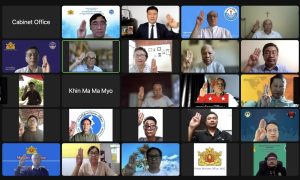Nearly two years after seizing power in a coup, Myanmar’s military government has again failed in its attempt to claim the country’s seat at the United Nations General Assembly (UNGA) – though it remains to be seen whether the rest of the U.N. ecosystem will follow suit.
The rejection was formalized in a session on Friday, when the UNGA rejected the junta’s bid for recognition, along with similar attempts by Afghanistan’s Taliban rulers and a rival Libyan government based in the east of the country.
The 193-member world body voted by consensus to approve a recommendation by its Credentials Committee, which has the task of determining which representatives can attend and speak on behalf of their countries, that the requests be deferred.
“The committee decided to postpone its consideration of the credentials pertaining to the representatives of Myanmar, Afghanistan, and of Libya” to a future time in the current UNGA session, which ends next September, said Assembly President Csaba Kőrösi, The Associated Press reported. Earlier reports stated that the decision was made by the committee on December 12.
The decision marks a setback for the military government’s bid for international acceptance, and means that Myanmar’s seat will continue to be occupied by Kyaw Moe Tun, who represents the opposition National Unity Government (NUG) formed shortly after the coup.
Kyaw Moe Tun was Myanmar’s representative to the U.N. when the military launched a coup and ousted civilian leader Aung San Suu Kyi on February 1, 2021. Three weeks later, as protests swept the country, he gave an impassioned address to the UNGA, in which he publicly broke with the junta, calling for the “strongest possible action from the international community to immediately end the military coup, to stop oppressing the innocent people, to return the state power to the people, and to restore the democracy.”
Myanmar’s junta has since waged an unsuccessful campaign to remove Kyaw Moe Tun from his post in New York and replace him with its own candidate. This has involved working both within the U.N.’s formal process – and allegedly outside of them. In August 2021, U.S. authorities announced that they had arrested two Myanmar citizens for allegedly plotting to “seriously injure or kill” the ambassador.
While the vote is a victory for the NUG, the global body’s various other organs have adopted their own decisions about how to handle the question of Myanmar’s representation, resulting in “glaring inconsistencies” within the U.N. system, the London-based Myanmar Accountability Project (MAP) said in a statement last week.
While Kyaw Moe Tun occupies Myanmar’s seat in the UNGA, the group noted, military officials are representing Myanmar in the ongoing genocide case at the International Court of Justice in The Hague. Meanwhile, the U.N. Human Rights Council has chosen to leave Myanmar’s seat vacant, with the result that the country’s upcoming Universal Periodic Review, where the junta’s abuses would likely have received a full airing, will not be held – a rare occurrence for a U.N. member state.
In the MAP statement, the group’s director Chris Gunness welcomed the UNGA vote, saying that it had “great diplomatic and symbolic significance,” but that other U.N. bodies needed to fall in line.
MAP cited U.N. Resolution 396(V), passed in 1950, which states that when the question of a state’s representation at the U.N. “becomes the subject of controversy … the attitude adopted by the General Assembly […] should be taken into account in other organs of the United Nations and the specialized agencies.”
The question appears to hang on the issue of exactly what “attitude” the UNGA has taken in this matter. The Credentials Committee chose to defer its decision as to the legitimate occupant of Myanmar’s seat, rather than actively conferring that designation on the NUG, which could be interpreted as a call to freeze the status quo pending a decision further down the line.
But MAP’s Gunness said in an email that the deferral constituted a recognition of the NUG as the legitimate occupant of Myanmar’s seat, without even addressing its human rights record and democratic credentials, which often weigh into the Credentials Committee’s decisions. “The decision to leave the NUG Ambassador, Kyaw Moe Tun, in his seat, is a decision, however you dress it up for diplomatic purposes,” he wrote.
He added that the vote has now created a “very solid legal basis for the NUG to be represented in other bodies across the U.N. system,” describing the General Assembly as the global body’s “mother ship.”
“At the end of the day, the U.N. Charter espouses democratic values and in the November 2020 election, the people of Myanmar voted overwhelmingly to reject military rule and embrace a democratic future,” Gunness added. “The UNGA has endorsed this decision twice now, and it is imperative that the rest of the U.N. follows the example of its mother ship and resolve the glaring inconsistencies in Myanmar’s representation by allowing the NUG to represent Myanmar.”

































